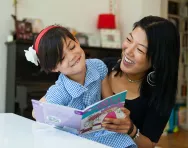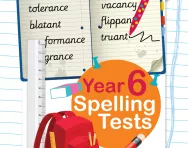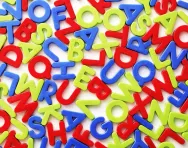Important update from TheSchoolRun
For the past 13 years, TheSchoolRun has been run by a small team of mums working from home, dedicated to providing quality educational resources to primary school parents. Unfortunately, rising supplier costs and falling revenue have made it impossible for us to continue operating, and we’ve had to make the difficult decision to close. The good news: We’ve arranged for another educational provider to take over many of our resources. These will be hosted on a new portal, where the content will be updated and expanded to support your child’s learning.
What this means for subscribers:
- Your subscription is still active, and for now, you can keep using the website as normal — just log in with your usual details to access all our articles and resources*.
- In a few months, all resources will move to the new portal. You’ll continue to have access there until your subscription ends. We’ll send you full details nearer the time.
- As a thank you for your support, we’ll also be sending you 16 primary school eBooks (worth £108.84) to download and keep.
A few changes to be aware of:
- The Learning Journey weekly email has ended, but your child’s plan will still be updated on your dashboard each Monday. Just log in to see the recommended worksheets.
- The 11+ weekly emails have now ended. We sent you all the remaining emails in the series at the end of March — please check your inbox (and spam folder) if you haven’t seen them. You can also follow the full programme here: 11+ Learning Journey.
If you have any questions, please contact us at [email protected]. Thank you for being part of our journey it’s been a privilege to support your family’s learning.
*If you need to reset your password, it will still work as usual. Please check your spam folder if the reset email doesn’t appear in your inbox.
SATs advice: spelling strategies

Children will be given a spelling test as part of their SATs, so it is a good idea to practise spellings at home as much as you can. In any subject, a confident speller can devote more time to thinking about the content of their writing, working on their handwriting and building up their writing speed.
Here are some ways you can support this spelling learning at home through every Key Stage.
Spelling success in Key Stage 1
Apart from helping your child to learn the spellings they bring home from school, a good way of finding out where your child needs help is to get them to write you a short story and see which words they are struggling with.
It could be that they find it hard to spell vowel digraphs (two vowels which make one sound, such as ai, ee, ie, ea, etc.)
- Make them some word cards including lots of words which use these various digraphs (for example: rain, feet, pie, read, stain, cried, etc).
- Encourage your child to look at all the words and say them out loud, then put them into groups according to their digraphs.
- Help them practise spelling them by picking up a word, saying it out loud and asking them to spell it out loud for you.
- If they are struggling with sorting them, encourage them to underline the vowel digraph in the word so that they can see clearly which letters are making the one sound.
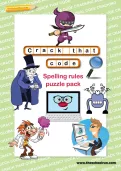
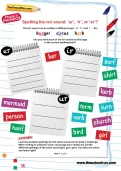
Claim FREE Spelling Resources Today
- Spelling workbooks
- Step-by-step programme
- Spelling test packs
- 100s of worksheets & games
The classic ‘Look, Cover, Write and Check' method is a tried-and-tested technique for helping younger children with their spelling. Here’s how it works:
- Look - Is there a certain shape to a word? Are there any words within words?
- Say - Are there any sounds within the words?
- Cover - Cover over the word with your hand or a piece of paper and try to visualise the word
- Write - Practise writing the word down.
- Check - Keep checking spellings. Do the words look right?
Important note: KS1 SATs are now optional.
Key Stage 2 spelling strategies
In Key Stage 2, your child will probably be given lists of spellings to take home that follow various rules or contain certain prefixes or suffixes (for example they may be given a list of words that follow the rule: 'i before e except after c', or words beginning with the prefix 'un' or ending with the suffix 'hood').
They may be given a list of pairs of homophones (words with different meanings but which sound the same).
Alternatively, they may be given a list of spellings that relate to a topic they are learning about (for example, if they are learning about Ancient Egypt, they may need to learn how to spell 'mummification' and 'papyrus').
See if you can encourage them to learn their spellings by using a range of activities:
Encourage your child to split a word up into syllables when learning to spell.
For example, expensive can be split into three syllables: ex-pen-sive. If they are given a list of spellings to learn which all have two or more syllables, write each of these syllables on a separate card. Jumble up the cards and then see if your child can put them back together to make the original words.
Some spellings do not sound the way they are said. Encourage your child to learn these spellings by making every sound when they pronounce them (even though this is not how they will usually say them) for example: when saying 'separate' encourage them to make a big deal of over pronouncing the middle part of the word: 'sePARate'. This will encourage them to spell the word correctly, rather than falling into the common trap of spelling it 'seperate'.
If your child is learning words with a certain prefix or suffix, get them to write all these words onto some cut-out pieces of card. Put all the cards down face up on a table. Start by choosing a word without telling your child what it is and then giving them a definition for this word. They need to work out which word you are thinking of. If they guess correctly, they get to keep the card. If they get it wrong, you get to take the card. The person with the most cards at the end wins!
Write 'fill the gap' sentences for your child, for example, if your child is learning about words containing ie / ei such as ceiling, receive, believe, friend, deceive, grieve, reprieve, write sentences like the following for them to complete:
We painted the ________________ white.
I _____________ this letter in the post.
You could do this on the computer to support their typing skills at the same time (but turn the automatic spell-checker off!).
Encourage your child to join their handwriting at all times when they are writing out their spellings. This not only helps with handwriting practice, but joining one letter to another can help them to remember the letter strings within the words better.
Spelling practice doesn't have to be about drilling – spelling games add a competitive edge, unusual techniques add interest to memorising lists of words and a few practical spelling worksheets will help your child consolidate their learning.
